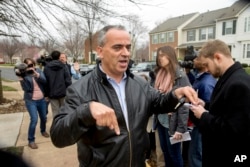An American citizen who fled the United States and joined the Islamic State terror group before claiming to have undergone a change of heart is back in the country to face terror charges.
Looking thin and ragged, Mohamad Jamal Khweis was escorted into a federal courtroom in Alexandria, Virginia, Thursday. He wore a dark blue t-shirt and grayish slacks, while sporting a closely-cropped haircut.
His father, mother and brother waved at him anxiously. According to his defense attorney, the family was seeing Khweis for the first time since he left to join IS.
The 26-year-old first made headlines when he was detained by Kurdish Peshmerga forces in northern Iraq in March, becoming one of just a handful of American IS to be captured on the battlefield.
Khweis, who said little during his initial court appearance, is charged with providing and conspiring to provide material support to IS. The counts carry a maximum penalty of 20 years behind bars, a $250,000 fine and a lifetime of supervised release.
Khweis was not required to enter a plea, and his lawyer cautioned against reading too much into the government’s court filings.
“Everything is not as it appears,” Attorney John Zwerling told reporters outside the courthouse.
Case against Khweis
According to the criminal complaint, FBI agents interrogated Khweis while he was in Kurdish custody in Iraq. He admitted he had researched IS in the U.S., watched propaganda videos of IS fighters carrying out terrorist operations and executions, and became interested in actually traveling to the self-declared caliphate in mid-2015.
In December 2015, he boarded a flight at Baltimore-Washington Thurgood Marshall Airport to London, staying there for several days before continuing on to Turkey and crossing the border into Syria.
Once in the IS stronghold of Raqqa, he was sent to a safe house, where he was questioned by IS officials and given the name Abu Omar al-Amriki.
“The defendant stated another ISIL member asked him if he wanted to be a suicide bomber,” FBI Special Agent Victoria Martinez, wrote in the criminal complaint unsealed Thursday. “The defendant answered ‘yes’.
“The defendant stated that he thought this question was intended to test his commitment,” Martinez added.
Also while in Raqqa, Khweis described how he and other foreign recruits met with Jaysh Kalifa, often described as IS’ elite military unit.
“The representatives explained that their group was responsible for accepting volunteers from foreign countries who would be trained and sent back” to conduct terror operations, according to the complaint.
Still, investigators say Khweis maintained he only touched a firearm once, moving a gun that was left on a couch so he could sit down.
Damning details
“It’s a very unique case,” said Seamus Hughes, deputy director of the Program on Extremism at George Washington University. “Very rarely do you get a criminal complaint with this level of detail.”
Hughes warned the details could be damning.
“He wasn’t a naïve kid that didn’t know about ISIS,” Hughes said. “It’s very clear that Mohamad went in there bright eyed and knew what he was getting into.”
Counterterror experts like Hughes say Khweis’ case also presents the U.S. with an opportunity to deliver a powerful message to other Americans who may be tempted to join IS or other violent jihadist groups.
“To have a guy like this who can say listen, I was there is very, very important,” said Mubin Shaikh, an expert who has worked with the Canadian Security Intelligence Service and testified before U.S. lawmakers in Congress.
“What this one guy can do is more valuable than millions of dollars of advertising, of Twitter accounts,” he said.
The key, according to Shaikh, is that based on the initial evidence – Khweis left voluntarily and does not seem to “have blood on his hands.” He said, the Alexandria, Virginia resident appears to be part of a category of foreign fighters who can be rehabilitated.
Inconsistencies
Yet, questions remain about Khweis’ case and some of the information he shared during his on-camera interview with Kurdish television does not match what he told the FBI investigators.
“I wasn’t thinking straight,” Khweis said in English during a heavily edited portion of the interview. “I made a bad decision to go with [a] girl and go to Mosul.”
He also described how the Iraqi girl, the sister of a woman married to an IS fighter, made all the arrangements for the journey.
The criminal complaint, however, makes no mention of any girl.
There are also some questions about what Khweis was carrying with him when he surrendered to Kurdish forces, including his Virginia driver’s license, three mobile phones, memory cards, two bank cards, and more than $450 in U.S. bills.
According to Khweis’ attorney, John Zwerling, the 26-year-old had been in Kurdish custody in Irbil since his surrender. He said that Kurdish officials were present with Khweis at all times, even during the interrogation session by FBI agents.
Happy to have Khweis back
Zwerling said Khweis’ parents are glad their son is back in the U.S.
“The love him,” he said. “They’re very anxious, but they’re glad he’s back.”
At the time of his capture by Kurdish forces, Khweis’ parents expressed shock, saying they had no idea he was in Iraq or had ties with any extremist groups.
"We thought he was in Canada lately,” a woman who identified herself as Khweis' mother told VOA. “We also know he has been traveling to Turkey.”
The parents said they are of Palestinian background. The father said he came to the U.S. in 1988.
VOA's Sirwan Kajjo contributed to this report.




![Mohamad Jamal Khweis, an American who allegedly joined and then defected from the Islamic State group, says he 'made a bad decision to go with [a] girl and go to Mosul' in Iraq. This screen grab was taken from a Kurdish24 video released March 17, 2016.](https://gdb.voanews.com/f1f18bd0-53bf-43cb-9a6f-884cabb84eb2_cx0_cy0_cw93_w250_r1_s.jpg)

